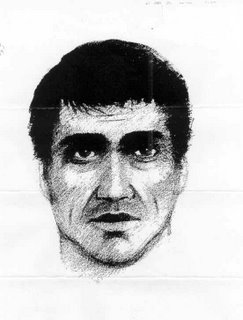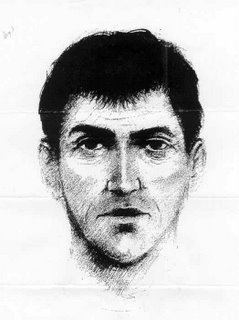The Mysterious Mr.Mughrabi

THIS is the mystery figure involved in the 1994 London bombings, for which two Palestinians, both claiming innocence, are half-way through a 20 year sentence. The portraits are of
RIDA MUGHRABI, as described separately by Jawad Botmeh(version on left) and Samar Alami (version on right). Close enough to be the same man. But police were not interested.

SAMAR Alami met Rida Mughrabi in the spring of 1992, at a lecture in London on the Middle East. He also attended various political discussions and poetry readings at the Arab Club in London.
Apparently Mughrabi was from the West Bank. He had been detained by the Israelis in the late 1970s, had taught at a refugee camp in Jordan and had been involved in fighting Israeli forces in occupied southern Lebanon during the 1982 war. Samar, and then Jawad, were impressed by his seeming experience and knowledge of resistance.
Samar and Jawed had mixed feelings about the "peace process" which the 1993 Oslo Accords were supposed to open up, promising Palestinian "self-government". Samar had hopes of using her studies on Water Resources, a vital issue in the region. Jawed started a business to send high-tech products for development in the West Bank. But fearing to place too much hope in the Oslo deal, they had also secretly experimented amateurishly with home-made explosive devices, and use of radio-controlled model planes, seeking a modern equivalent of David's slingshot which Palestinian villagers might be able to use against the heavily-armed Israeli Goliath.
They wanted to keep this their secret. But in 1993 Mughrabi began discussing methods of resistance open to Palestinians inside the Occupied Territories. He knew a lot about electric and electronic aspects of military surveillance. He seemed to have direct experience in the field during the Israeli invasion and occupation of Lebanon. Indeed, Mughrabi told Samar that he had been doing some experimenting of his own and what he was giving her was the product. She thought that he had actually been performing his experiments for the same reasons as she and Jawad had e.g. directed at what could be done inside the Occupied Territories. (The Popular Front for the Liberation of Palestine, with which Samar and Jawad sympathised, had decided decades before to carry out no more operations in overseas countries).
Later, piecing together what he told them, it seemed Mughrabi had left Lebanon in the early 1980s after falling out with the PLO and with Arafat's opponents, and then came to Britain via Cyprus. In the mid-1980s he moved to Saudi Arabia, then Kuwait, but when Iraq invaded he returned to Britain and went to live in Birmingham.
Jawad Botmeh had a hobby. He had started buying and selling cars while still an engineering student. Friends and acquaintances often sought his advice. So he was not surprised when Rida Mughrabi contacted him on June 14, asking Jawad to come with him to a car auction. They had been on such trips before. They drove up to Northampton together later that day, but did not find anything worth buying for the £1,000 that Mughrabi had to spend.
The following day they went to an auction in Milton Keynes, and this was where Mughrabi bought an Audi. This was to be the car used in the Israeli embassy bombing, though by then it was equipped with fake number plates. The car used in the Balfour House bombing was a Triumph Acclaim, also with false plates, but traced back to an auction in Birmingham on June 13, where it was bought by a man calling himself "George Davis".
Jawad Botmen had not been at the Birmingham auction, nor had Rida Mughrabi said anything to him about having bought another car. But when police started enquiring about those car auctions they became interested in a distinctive old white BMW seen at the auction in Milton Keynes. Trawling though the owners of old white BMWs they came up with Jawad Botmeh. In fact while driving up to Northampton with Mughrabi on June 14, Jawad had overtaken a police car, and was stopped on the M1 for speeding, having to show his licence. Evidently he was not being as careful to avoid attention as someone might have been who knew the significance of what seemed a casual car-shopping trip.
The fingerprints and handwriting on the purchase documents of both cars, and the descriptions of the purchasers as given by witnesses, match none of the defendants. There is no trace of the people who bought the cars and neither is it known where they were stored and made into car bombs.
But Jawad had been at the wrong place with the wrong person. He was put under sustained police surveillance from September 1994, at least, onwards and then arrested at home in January 1995 in a dawn police raid. On January 17 police acting under the Prevention of Terrorism Act raided the homes of four other people of Palestinian origin who had been observed to be his 'associates'. Their homes were searched without any legal representatives being present. One of his friends was also arrested by the army while she was on holiday in Israel. Those arrested in Britain included Jawad's friend Samar Alami, his friend and business partner Mahmoud Abu-Wardeh and Mrs Nadia Zekra whom he only knew slightly because he sometimes used to play football with her son.
Jawad and Nadia were charged with conspiracy to cause explosions in the United Kingdom. They were detained as 'Category A'prisoners, imprisoned in London at Belmarsh and Holloway respectively. The others, including Samar and Mahmoud, were released without charge and allowed to go home.
Successive police swoops over the next few months concentrated on the same group of people. Samar's sister and Jawad's wife Elizabeth were among those arrested. Jawad's friend who had been detained in Israel was arrested when she returned to Britain, she was detained until the next day but then released without charge.
In March 1995 Samar was arrested again by the Anti-Terrorist Branch, in a 7.00am raid. She too was charged with being involved in the conspiracy and was remanded in custody at Holloway prison, where she met Nadia for the first time. Samar's sister was also arrested, but later released without charge, and their shared family home was again searched by the police without anyone being present.
Samar was released on bail a couple of months later in May. More than fifty letters were written in support of her bail application and the judge granting it said that he had never seen such serious and significant tributes to any single individual. Nadia was also released on bail in May.
But then, in June, Samar was arrested again after the police investigated a small locker unit at Nationwide Storage in west London. This locker contained a small quantity of TATP explosive powder, a little more made into two tiny basic explosive devices, two guns, some chemicals, timers, electronic circuitry, an aerial, some political books and magazines and various other items. The three timers were linked to an order of six bought under a false name in May/June 1994 and as the judge confirmed, "There is absolutely nothing to connect any of these defendants with the purchase of the timers."
Once again, Rida Mughrabi was involved. He had met Samar in central London one afternoon, at the end of June 1994, and given her some boxes. He said that he no longer needed the products of his experiments because he was leaving England. Samar felt uncomfortable, and unsure what to do, did not feel she could say no and so she accepted them. "I guess I was a bit naive." she said at the trial, "I never felt threatened by Rida Mughrabi. I didn't take nearly enough precautions."
Samar and Jawad used a little of the TATP Mughrabi gave them to make up two little 'bomblets' on 15 July. But Samar was about to join her parents in France on holiday two days later and she and Jawad did not have time to try them out before she went, so she rented the locker on 16 July to store them safely. When the bomblets were discovered by the police they were not in any state to have ever gone off and the two metal rods stuck into the TATP had corroded and were useless.
Samar had returned to Britain after that holiday in France, just as she also returned from her trip to Lebanon later in the year to carry out some research for her MSc thesis. She made no attempts to escape from Britain, despite having every opportunity to do so -- hardly the actions of a guilty person.
The chemicals in the locker turned out to have been part of a much larger order collected from Hays Chemicals in Birmingham in June 1994 by someone giving the name 'G Davis' - more or less the same name used in the car purchase. The contents of this locker unit became a major part of the prosecution case despite the fact that nothing in the locker has ever been connected with the Israeli Embassy or Balfour House explosions. The explosive used in the bombings has never been identified, but both British and Israeli government scientists ruled out TATP, which experts say is not suitable for car bombs.
Jawas and Samar had been reluctant to talk about their experiments or involvement with explosives. Even if they got off they feared being deported, and becoming marked targets for the Israeli But once they came to realise they had been set up, named Rida Mughrabi, and talked about his involvement they found the authorities were not interested. The police did not even ask for a detailed description. It was left to their solicitor, Gareth Pierce, to arrange for a portrait to be compiled. When it was, after Samar and Jawad had each been in separate prisons for over a year since the trial, their descriptions ennabled the sketch artist to draw two faces, similar enough to be the same man, who was clearly involved in the bombings.
As lawyer Daniel Guedella comments in his pamphlet "Justice Denied", "The police admit that the case is not 'solved', that the actual bombers have not been caught. So it is odd, to say the least, that they have so little interest in Rida Mughrabi".
http://www.freesaj.org.uk/
Could it be that they were told not to follow up this trail for fear of where it leads? Perhaps by whoever had decided to do nothing with the information which the intelligence services had before the bombings took place? We don't know. But whatever the bigger picture, it looks like those in power would sooner keep two most likely innocent people in prison than pursue the real culprits, or the truth, which may be "undiplomatic". Those happy to refer to Jawad and Samar as "the embassy bombers" and retail lies about them being "linked with Hizbollah" are helping in the conspiracy.
Labels: bombings, Palestinians, prisoners, Samar and Jawed, Secrets

0 Comments:
Post a Comment
<< Home